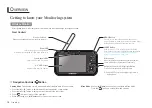
5
(E)42DPC85
Important notes about your Plasma monitor
The following symptoms are not signs of malfunction,
but rather technical limitations of plasma monitor
technology.
1) The display of this Plasma monitor radiates infrared rays. It
may affect other infrared communication equipment under
certain operating conditions.
2) Under certain conditions, the display of this Plasma
monitor may cause interference with the audio and/or
video of certain types of electronic equipment that easily
receive electromagnetic waves (e.g., AM radios and video
equipment). In particular, the display of this Plasma
monitor may affect certain types of electronic equipment
that are located beyond the area where the Plasma
monitor is being used.
3) The display panel of this Plasma monitor is manufactured
using an extremely high level of precision technology.
However, occasionally some parts of the screen may be
missing picture elements and/or have luminous spots.
4) You can enjoy playing video games on this Plasma
monitor. However, certain video games that utilize so-
called “light gun” joysticks for shooting at on-screen
targets may not work with this Plasma monitor.
5)
Possible Adverse Effects on Plasma Display
Like all phosphor-based display devices and all gas-based
plasma displays, the display of this Plasma monitor may be
susceptible to permanent ghost images (also known as
phosphor burn-in) under certain circumstances. Certain
operating conditions may accelerate the potential for
phosphor burn-in, including but not limited to the
following:
• Displaying
fixed (non-moving) images,
including but
not limited to closed captions, video game patterns, TV
station logos, stock tickers, and websites.
FCC Compliance Statement (Part 15):
• Displaying
special formats
that do not use the entire
screen, including but not limited to widescreen or
letterbox format media viewed on a 4:3 aspect ratio
display (with gray or black bars at the top and bottom of
the screen) and 4:3 aspect ratio format media viewed on
a widescreen/16:9 aspect ratio display (with gray or
black bars on the left and right sides of the screen).
To minimize the potential for the occurrence of phosphor
burn-in, Toshiba recommends the following:
• Display a moving image on the display of your Plasma
monitor whenever possible.
• Always turn off the power of your Plasma monitor when
you are finished using it.
• Reduce the Brightness and Contrast levels as much as
possible without impairing image quality.
• Enable the LONG LIFE settings (see page 28, 29).
• Try to display images that have many colors and color
gradations (i.e., photographic or photo-realistic images).
• Try to display images that have minimal contrast
between light and dark areas (e.g., avoid white
characters on black backgrounds).
• Try to avoid displaying images that have few colors and/
or that have distinct, sharply defined borders between
colors.
About the ISM function
This monitor contains an “image sticking minimization” (ISM)
feature that automatically starts to decrease the picture
brightness in small increments when a fixed (non-moving)
image is displayed on-screen for an extended period of time.
This feature helps to reduce and delay the potential for
phosphor burn-in. The time delay and rate of decreasing
picture brightness depend on the brightness of the displayed
image.
The
Toshiba 42DPC85 Plasma Color Monitor
comply
with Part 15 of the FCC rules.
Operation is subject to the following two conditions: (1)
this device may not cause harmful interference, and (2)
this device must accept any interference that may cause
undesired operation.
Note:
This equipment has been tested and found to comply with
the limits for a Class B device, pursuant to Part 15 of the FCC rules.
These limits are designed to provide reasonable protection against
harmful interference in a residential installation. This equipment
generates, uses, and can radiate radio frequency energy and, if not
installed and used in accordance with the instructions, may cause
harmful interference to radio communications. However, there is no
guarantee that interference will not occur in a particular
installation. If this equipment does cause harmful interference to
radio or television reception, which can be determined by removing
and applying power to the equipment, the user is encouraged to try
to correct the interference by one or more of the following
measures:
- Reorient or relocate the receiving antenna.
- Increase the separation between the equipment and the
receiver.
- Connect the equipment into an outlet on a circuit different
from that to which the receiver is connected.
- Consult the dealer or an experienced radio/TV technician
for help.
CAUTION:
Changes or modifications to this equipment not
expressly approved by Toshiba could void the user’s authority to
operate this equipment.
#01E02-05_42DPC85
7/29/05, 12:45 PM
5
Black






































